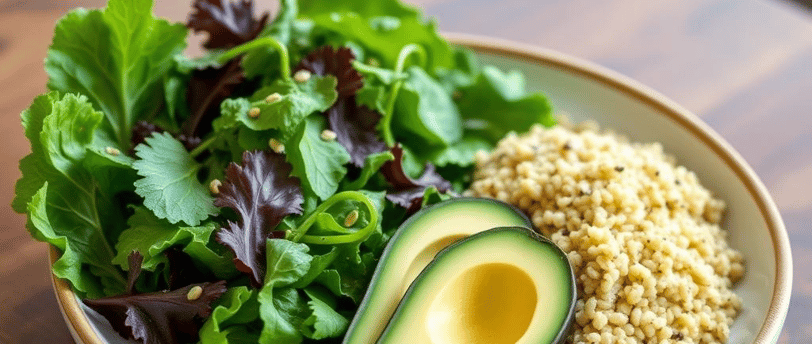Maintain a Balanced pH in Your Gut – Reduce Processed Foods and Eat More Alkalizing Plants
🧘WELLNESS TIPS🌱 GUT HEALTH & DIGESTION


The conversation around gut health has risen to prominence, with an increasing number of individuals looking for solutions to improve their overall well-being. One aspect that plays a crucial role in our gut health is the pH level within our digestive system. This article will explore the importance of maintaining a balanced pH, the impact of processed foods on our gut, and how incorporating more alkalizing plants into our diets can pave the way for a healthier gut flora. Backed by scientific evidence, we will illuminate the connection between diet, pH balance, and optimal digestive health.
Understanding pH and Its Role in Gut Health
The pH scale ranges from 0 to 14, with 7 being neutral. Values below 7 indicate acidity, while values above 7 represent alkalinity. Our gut exists in a delicate balance, and maintaining an optimal pH level (around 6.5 to 7.5) is essential for digestive efficiency. This balance can influence enzyme activity, the absorption of nutrients, and the overall health of gut microbiota.
An imbalance in gut pH can lead to various digestive issues, including acid reflux, indigestion, and a variety of gastrointestinal disorders. Notably, the gut is home to trillions of microorganisms known as the gut microbiome, which play a pivotal role in digestion, immunity, and even mental health. Scientific evidence suggests that a healthy gut microbiome thrives in a balanced pH environment, while excess acidity and alkalinity can create a breeding ground for harmful bacteria, leading to dysbiosis—a disruption in the delicate microbial balance.
The Impact of Processed Foods on Gut pH
One significant factor contributing to an unbalanced gut pH is the consumption of processed foods. Highly refined foods, loaded with sugars, artificial additives, and unhealthy fats, can dramatically alter the gut's internal environment. These foods not only tend to be acidic but also lack essential nutrients necessary for maintaining a healthy gut.
1. Increased Acidity:
Many processed foods, such as sugary snacks, sodas, and white bread, can lead to increased acidity levels in the gut. Studies indicate that high-sugar and high-fat diets are associated with an imbalance in gut microbiota, exacerbating inflammation and promoting an acidic environment (Zhang et al., 2017).
2. Reduced Nutritional Value:
Processed foods typically provide empty calories, lacking in vital vitamins, minerals, and fiber. Fiber, in particular, plays a critical role in gut health, as it serves as food for beneficial bacteria. A deficit in fiber can lead to dysbiosis and contribute to digestive problems (De Vries et al., 2019).
3. Inflammatory Response:
Artificial additives found in many processed foods can trigger inflammation in the digestive tract. Chronic inflammation is closely linked to a variety of gastrointestinal conditions, including inflammatory bowel disease (IBD) and irritable bowel syndrome (IBS) (Mason et al., 2020).
Given these negative impacts, it is clear that reducing processed foods in our diet is an essential step towards achieving a balanced pH in the gut. However, replacement is just as crucial as reduction.
Embracing Alkalizing Plants
To restore balance in your gut pH, increasing the intake of alkalizing foods—specifically plants—can be incredibly beneficial. Here are some categories of alkalizing plants that you can integrate into your diet:
1. Leafy Greens:
Spinach, kale, and Swiss chard are excellent sources of alkaline minerals. They help neutralize excess acidity in the body and provide crucial nutrients like vitamins A, C, and K. A study published in the Journal of Nutritional Biochemistry highlights the health benefits of leafy greens in supporting gut health and reducing markers of inflammation (Knekt et al., 2004).
2. Cruciferous Vegetables:
Broccoli, cauliflower, and Brussels sprouts are loaded with nutrients and promote the production of enzymes involved in detoxification and maintaining pH balance. These vegetables contain glucosinolates, which have been linked to a reduced risk of cancer and other chronic diseases (Jiang et al., 2016).
3. Fruits:
While some fruits are acidic in nature, many, such as lemons, limes, avocados, and watermelon, have an alkaline effect on the body. They are rich in vitamins, minerals, and antioxidants that promote gut health. The study by Barbalho et al. (2021) suggests that fruits may help regulate the gut microbiome, which is essential for maintaining a balanced pH.
4. Herbs and Spices:
Herbs like parsley, cilantro, and mint can enhance the alkalinity of your meals and offer additional health benefits. Spices such as turmeric and ginger possess anti-inflammatory properties that soothe the gut and support a balanced pH (Elkhateeb et al., 2021).
5. Fermented Foods:
These foods—like yogurt, kefir, kimchi, and sauerkraut—are rich in probiotics, promoting a thriving gut microbiome. While they may not directly alter pH, they help maintain a balanced gut environment through the introduction of beneficial bacteria, contributing to an overall healthy digestive system (Kau et al., 2011).
Conclusion: Taking Control of Your Gut Health
Maintaining a balanced pH in your gut is vital for optimal health. By reducing the intake of processed foods and prioritizing the consumption of alkalizing plants, you can create a thriving environment for your gut microbiome. This practice will not only enhance digestive functions but will also contribute to overall wellness.
Incorporate leafy greens, cruciferous vegetables, a variety of fruits, herbs, and fermented foods into your diet to ensure you’re giving your gut the best chance at health. Scientific evidence supports the idea that a balanced gut pH can lead to improved digestion, greater nutrient absorption, and even enhanced mental health. By making mindful dietary choices, you can take a significant step towards better health and well-being.
